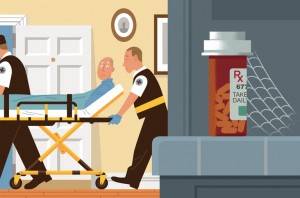- California Assembly OKs highest minimum wage in nation
- S. Korea unveils first graphic cigarette warnings
- US joins with South Korea, Japan in bid to deter North Korea
- LPGA golfer Chun In-gee finally back in action
- S. Korea won’t be top seed in final World Cup qualification round
- US men’s soccer misses 2nd straight Olympics
- US back on track in qualifying with 4-0 win over Guatemala
- High-intensity workout injuries spawn cottage industry
- CDC expands range of Zika mosquitoes into parts of Northeast
- Who knew? ‘The Walking Dead’ is helping families connect
The Cost of Not Taking Your Medicine
New York Times
There is an out-of-control epidemic in the United States that costs more and affects more people than any disease Americans currently worry about. It’s called nonadherence to prescribed medications, and it is — potentially, at least — 100 percent preventable by the very individuals it afflicts.
The numbers are staggering. “Studies have consistently shown that 20 percent to 30 percent of medication prescriptions are never filled, and that approximately 50 percent of medications for chronic disease are not taken as prescribed,” according to a review in Annals of Internal Medicine. People who do take prescription medications — whether it’s for a simple infection or a life-threatening condition — typically take only about half the prescribed doses.
This lack of adherence, the Annals authors wrote, is estimated to cause approximately 125,000 deaths and at least 10 percent of hospitalizations, and to cost the American health care system between $100 billion and $289 billion a year.
Former Surgeon General C. Everett Koop put it bluntly: “Drugs don’t work in patients who don’t take them.” This partly explains why new drugs that perform spectacularly well in studies, when patients are monitored to be sure they follow doctors’ orders, fail to measure up once the drug hits the commercial market.
More important, it explains why so many patients don’t get better, suffer surprising relapses or even die when they are given drug prescriptions that should keep their disorders under control.
Studies have shown that a third of kidney transplant patients don’t take their anti-rejection medications, 41 percent of heart attack patients don’t take their blood pressure medications, and half of children with asthma either don’t use their inhalers at all or use them inconsistently.
“When people don’t take the medications prescribed for them, emergency department visits and hospitalizations increase and more people die,” said Bruce Bender, co-director of the Center for Health Promotion at National Jewish Health in Denver. “Nonadherence is a huge problem, and there’s no one solution because there are many different reasons why it happens.”
For example, he said parents often stop their children’s asthma treatment “because they just don’t like the idea of keeping kids on medication indefinitely.” Although a child with asthma may have no apparent symptoms, there is underlying inflammation in the lungs and without treatment, “if the child gets a cold, it can result in six weeks of illness,” Dr. Bender explained.
When Dr. Lisa Rosenbaum, a cardiologist at Brigham and Women’s Hospital in Boston, asked patients who had suffered a heart attack why they were not taking their medications, she got responses like “I’m old-fashioned — I don’t take medicine for nothing” from a man with failing kidneys, peripheral vascular disease, diabetes and a large clot in the pumping chamber of his heart. Another common response: “I’m not a pill person.”
When Dr. Rosenbaum told her hairdresser that she was studying why some people with heart disease don’t take their medications, he replied, “Medications remind people that they’re sick. Who wants to be sick?” He said his grandmother refuses to take drugs prescribed for her heart condition, but “she’ll take vitamins because she knows that’s what keeps her healthy,” so he tells her that the pills he gives her each night are vitamins.
Other patients resist medications because they view them as “chemicals” or “unnatural.” One man told Dr. Rosenbaum that before his heart attack, he’d switched from the statin his doctor prescribed to fish oil, which unlike statins has not been proved to lower cholesterol and stabilize arterial plaque.
“There’s a societal push to do things naturally,” she said in an interview. “The emphasis on diet and exercise convinces some people that they don’t have to take medications.”
Dr. Bender said, “People often do a test, stopping their medications for a few weeks, and if they don’t feel any different, they stay off them. This is especially common for medications that treat ‘silent’ conditions like heart disease and high blood pressure. Although the consequences of ignoring medication may not show up right away, it can result in serious long-term harm.”
Some patients do a cost-benefit analysis, he said. “Statins are cheap and there’s big data showing a huge payoff, but if people don’t see their arteries as a serious problem, they don’t think it’s worth taking a drug and they won’t stay on it. Or if they hear others talking about side effects, it drives down the decision to take it.”
Cost is another major deterrent. “When the co-pay for a drug hits $50 or more, adherence really drops,” Dr. Bender said. Or when a drug is very expensive, like the biologics used to treat rheumatoid arthritis that cost $4,000 a month, patients are less likely to take them or they take less than the prescribed dosage, which renders them less effective.
Dr. William Shrank, chief medical officer at the University of Pittsburgh Health Plan, said that when Aetna offered free medications to patients who survived a heart attack, adherence improved by 6 percent and there were 11 percent fewer heart attacks and strokes, compared with patients who paid for their medications and had an adherence rate of slightly better than 50 percent.
“There are so many reasons patients don’t adhere — the prescription may be too complicated, they get confused, they don’t have symptoms, they don’t like the side effects, they can’t pay for the drug, or they believe it’s a sign of weakness to need medication,” Dr. Shrank said. “This is why it’s so hard to fix the problem — any measure we try only addresses one factor.”
Still, there is hope for improvement, he said. Multiple drugs for a condition could be combined into one pill or packaged together, or dosing can be simplified. Doctors and pharmacists can use digital technology to interact with patients and periodically reinforce the importance of staying on their medication.
With fear of side effects a common deterrent to adherence, doctors should inform patients about likely side effects when issuing a prescription. Failing that, patients should ask: “What, if any, side effects am I most likely to encounter?”
Forgetting to take a prescribed drug is a common problem, especially for those ambivalent about taking medication. Patients can use various devices, including smartphones, to remind them to take the next dose, or use a buddy system to make adherence a team sport. Dr. Shrank suggested making pill-taking a habit, perhaps by putting their medication right next to their toothbrush.


















html color
April 21, 2017 at 7:18 PM
This is the information I am looking for. This article is clear and easy to understand. I’m learning more about this. Hope you bring more things related to it. Thanks a lot!
Pengobatan Sipilis Tanpa Ke Dokter
April 27, 2017 at 7:10 AM
Excellent information. This really made me add knowledge. Thank you very much. Hope Always update
Apa Obat Di Apotik Untuk Penyakit Sipilis
April 28, 2017 at 6:59 PM
Thank you for the information. Hopefully update always let me add my insight. The site I am most waiting for updates
bloxorz
May 4, 2017 at 3:06 AM
I enjoyed over read your blog post. Your blog have nice information, I got good ideas from this amazing blog. I am always searching like this type blog post. I hope I will see again
Apa Penyebab Kencing Mengeluarkan Nanah
May 22, 2017 at 7:13 PM
True, this is what I think too. Although somewhat different in opinion about the discussion, but mostly I agree with this site. Hope it always updates so I always increase my insight
Keluar air nanah dari kemaluan
May 22, 2017 at 7:53 PM
I always like what in this site post, always provide the information I need. Hope it always updates so I can add my insight from this site. Thank you
Obat Sipilis Dan Kencing Nanah
May 28, 2017 at 11:05 PM
Thanks for the information.
Obat keluar nanah dari kelamin
June 2, 2017 at 11:26 PM
I always follow this development. Whatever is done there is always a support and no. But for me, on this site shows the best thing for public consumption. Thank you very much. Hope it always updates so I can add my insight through this site.
Pets research
June 11, 2017 at 4:52 AM
Beautiful article i like it
Obat Hipotiroid Herbal
August 3, 2017 at 6:59 PM
Obat Hipotiroid Herbal
http://kumparan.com/thika-febriana/obat-hipotiroid-herbal-ampuh-atasi-hipotiroid-secara-tuntas
Obat ambeien herbal
August 8, 2017 at 4:45 PM
Hello good morning
Cara Mengobati Ejakulasi Dini
August 8, 2017 at 4:46 PM
Nice aricle..
eye care softgel
August 8, 2017 at 4:46 PM
Have a nice day, nice article.
Khasiat Walatra Gamat Emas Kapsul
August 11, 2017 at 4:47 PM
Thanks for the information.
6 Mitos Tentang Diabetes yang Ternyata Selama Ini Salah
August 17, 2017 at 12:10 AM
Nice post
Makanan Penurun Kolesterol
August 21, 2017 at 11:39 PM
nice information, thanks.
obat herpes ampuh
November 11, 2017 at 12:32 PM
nice information, thanks.
obat herpes ampuh
November 11, 2017 at 12:34 PM
nice information, helpful.
Modafinil online
November 23, 2017 at 10:37 PM
Hello, My name is Lisa and I’m a Healthcare adviser at Onlinepillsrx pharmacy. As a healthcare adviser, I’d like to say thank you for this informative article. It is often a problem to forget prescribed drug in a new generation. When the disease gets out of control then we can’t manage it, so taking prescribed drugs at a given time is essential for health. There are plenty of peoples who are affected by sleep disorders like narcolepsy, sleep apnea, and insomnia. We should be aware of that. Neurologists suggest Modafinil drug to treat them.